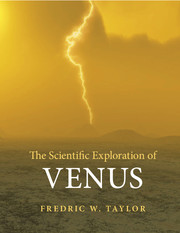Book contents
- Frontmatter
- Contents
- Overview
- Prologue
- A note on scientific units
- Acknowledgements
- Part I Views of Venus, from the beginning to the present day
- Part II The motivation to continue the quest
- Part III Plans and visions for the future
- Chapter 16 Solar system exploration
- Chapter 17 Coming soon to a planet near you
- Chapter 18 Towards the horizon
- Chapter 19 Beyond the Horizon
- Epilogue
- References and acknowledgements
- Appendix A Chronology of space missions to Venus
- Appendix B Data about Venus
- Index
- Plate section
Chapter 18 - Towards the horizon
advanced technology
from Part III - Plans and visions for the future
Published online by Cambridge University Press: 05 September 2014
- Frontmatter
- Contents
- Overview
- Prologue
- A note on scientific units
- Acknowledgements
- Part I Views of Venus, from the beginning to the present day
- Part II The motivation to continue the quest
- Part III Plans and visions for the future
- Chapter 16 Solar system exploration
- Chapter 17 Coming soon to a planet near you
- Chapter 18 Towards the horizon
- Chapter 19 Beyond the Horizon
- Epilogue
- References and acknowledgements
- Appendix A Chronology of space missions to Venus
- Appendix B Data about Venus
- Index
- Plate section
Summary
Larger, cheaper payloads: aerobraking and aerocapture
In the slightly longer term, missions to Venus are likely to benefit from various technical improvements that have been made or are in an advanced stage of development. For instance, there are two new techniques that will make it much cheaper to place a substantial mass in Venus orbit without using a very large and expensive launch vehicle. Both involve interaction with the atmosphere to slow the spacecraft down on arrival, thus eliminating some of the heavy rocket motors and the fuel that would otherwise be required.
Aerocapture is the approach in which the spacecraft is targeted accurately to the right pressure level so that atmospheric drag reduces its velocity relative to the planet to the point where it is captured into orbit. There is a risk, of course, that erroneous targeting, or poor knowledge of the atmospheric conditions, can result in the spacecraft crashing into the planet, or missing it altogether. In either case the margin available is not great.
- Type
- Chapter
- Information
- The Scientific Exploration of Venus , pp. 259 - 269Publisher: Cambridge University PressPrint publication year: 2014



